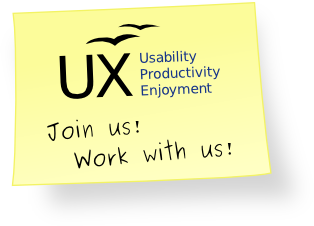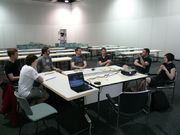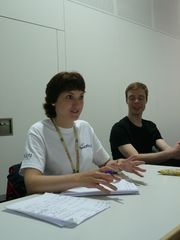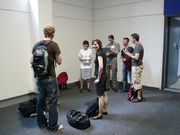Difference between revisions of "User Experience/Events/LinuxTag2010"
(Added →Place and Date/ Ort und Zeit) |
(finally added summary of topics discussed at meetup) |
||
| (5 intermediate revisions by 2 users not shown) | |||
| Line 5: | Line 5: | ||
'''Note:''' ''Italic'' text is some kind of German translation, since the LinuxTag will take place in Germany. | '''Note:''' ''Italic'' text is some kind of German translation, since the LinuxTag will take place in Germany. | ||
| − | An informal meeting to share thoughts, experiences and other information covering the topics Usability and User Experience in the Free Software world. The meeting is organized by Björn from OpenUsability.org and Christoph from the OpenOffice.org User Experience Team. | + | An informal meeting to share thoughts, experiences and other information covering the topics Usability and User Experience in the Free Software world. The meeting is organized by Björn from OpenUsability.org and Christoph from the OpenOffice.org User Experience Team. |
| − | You should participate if you are interested in: integrating User Centered Development into the development of your FOSS project, wanting to add your UX expertise to a FOSS project, wondering how to take benefits out of community work with real users, some usability tips for your FLOSS project, ... | + | You should participate if you are interested in: integrating User Centered Development into the development of your FOSS project, wanting to add your UX expertise to a FOSS project, wondering how to take benefits out of community work with real users, some usability tips for your FLOSS project, ... |
| − | Well, join us! | + | Well, join us! |
| − | ''Ein informelles Treffen, um Gedanken, Erfahrungen und andere Informationen in Bezug auf Usability (Gebrauchstauglichkeit, Benutzungsfreundlichkeit) in der Freien-Software-Welt auszutauschen. Das Treffen wird von Björn von OpenUsability.org sowie Christoph vom OpenOffice.org User Experience Team organisiert.<br>'' | + | ''Ein informelles Treffen, um Gedanken, Erfahrungen und andere Informationen in Bezug auf Usability (Gebrauchstauglichkeit, Benutzungsfreundlichkeit) in der Freien-Software-Welt auszutauschen. Das Treffen wird von Björn von OpenUsability.org sowie Christoph vom OpenOffice.org User Experience Team organisiert.<br>'' |
| − | ''Du solltes mitmachen, wenn Du an einem der folgenden Themen Interesse hast: Integrieren des nutzerzentrierten Entwicklungsprozesses in Dein Freies-Software-Projekt, Beitragen als UX-Experte in FOSS-Projekten, Nutzen der Erkenntnisse aus Community-Arbeit mit "echten" Anwendern, Erhalten von Usability-Tipps für Dein Projekt, ...<br>'' | + | ''Du solltes mitmachen, wenn Du an einem der folgenden Themen Interesse hast: Integrieren des nutzerzentrierten Entwicklungsprozesses in Dein Freies-Software-Projekt, Beitragen als UX-Experte in FOSS-Projekten, Nutzen der Erkenntnisse aus Community-Arbeit mit "echten" Anwendern, Erhalten von Usability-Tipps für Dein Projekt, ...<br>'' |
| − | ''Na dann los!'' | + | ''Na dann los!'' |
| − | + | ||
| − | + | ||
| − | + | ||
| − | + | ||
| − | + | ||
| − | + | ||
{| class="prettytable" | {| class="prettytable" | ||
| Line 37: | Line 31: | ||
I am working since a rather long time for OpenOffice.org and I have strong interestes in making something easy and pleasent to use. So I am very interested in all people who have the same goals ... or at least have interest in what we do. See you :-) | I am working since a rather long time for OpenOffice.org and I have strong interestes in making something easy and pleasent to use. So I am very interested in all people who have the same goals ... or at least have interest in what we do. See you :-) | ||
| − | ''Ich arbeite seit einiger Zeit für OpenOffice.org und habe ein starkes Interesse, dass Dinge gut zu benutzen sind und einfach Spaß machen. Tja, und deswegen bin ich an Kontakten mit Leuten interessiert, die die gleichen Ziele haben ... oder am Thema selbst interessiert sind. Bis bald also :-)'' | + | ''Ich arbeite seit einiger Zeit für OpenOffice.org und habe ein starkes Interesse, dass Dinge gut zu benutzen sind und einfach Spaß machen. Tja, und deswegen bin ich an Kontakten mit Leuten interessiert, die die gleichen Ziele haben ... oder am Thema selbst interessiert sind. Bis bald also :-)'' |
| yes / ''ja'' | | yes / ''ja'' | ||
| Line 50: | Line 44: | ||
| yes / ''ja'' | | yes / ''ja'' | ||
| + | |- | ||
| + | | <br> | ||
| + | | | ||
| + | '''Liz Matthis''' | ||
| + | |||
| + | OOo User Experience and Marketing | ||
| + | |||
| + | | yes | ||
| + | |- | ||
| + | | <br> | ||
| + | | | ||
| + | '''Lars Übernickel''' | ||
| + | |||
| + | Lars is software developer working on a new printing experience for Linux desktops. You may be interested in his talk on Thursday: [http://www.linuxtag.org/2010/de/program/freies-vortragsprogramm/mittwoch/vortragsdetails.html?talkid=265 The Common Printing Dialog]. | ||
| + | |||
| + | | arrived late :-)<br> | ||
| + | |- | ||
| + | | <br> | ||
| + | | ''... and some more!'' | ||
| + | | <br> | ||
|} | |} | ||
| Line 64: | Line 78: | ||
|- | |- | ||
| Building / Gebäude | | Building / Gebäude | ||
| − | | 7, 1a<br> | + | | Hall / ''Halle'' 7, 1a<br> |
|- | |- | ||
| Room / ''Raum'' | | Room / ''Raum'' | ||
| − | | [ | + | | [http://www.linuxtag.org/2010/uploads/media/Mietr%C3%A4ume_Plan.pdf Workshop Room "New York 2"]<br> |
|- | |- | ||
| Date and Time / ''Datum und Zeit'' | | Date and Time / ''Datum und Zeit'' | ||
| Line 76: | Line 90: | ||
|} | |} | ||
| + | |||
| + | == The Meetup in Retrospect<br> == | ||
| + | |||
| + | The nine participants that came to the meetup at the Linux Tag in Berlin on Friday June 11 introduced themselves and then said why they are interested in this meeting. The lively, informative and enlightening discussion that ensued lasted for more than three hours, and even for some throughout the rest of the day. The discussion took place in English, but also sometimes in German. A summary of the discussion points is further below. | ||
| + | |||
| + | If you have any questions or comments, feel free to mail "ChristophNoack at openoffice dot org" or "liz at openoffice dot org" or just add your additional feedback to this page. | ||
| + | |||
| + | '''Many thanks to everyone who participated!'''<br> | ||
| + | |||
| + | {| cellspacing="1" cellpadding="1" border="0" width="100%" | ||
| + | |- | ||
| + | | [[Image:UX LinuxTag2010 Meeting 1.JPG|thumb|center]] | ||
| + | | [[Image:UX LinuxTag2010 Meeting 2.JPG|thumb|center]] | ||
| + | | [[Image:UX LinuxTag2010 Meeting 3.JPG|thumb|center]] | ||
| + | |} | ||
| + | |||
| + | == Summary<br> == | ||
| + | |||
| + | We touched on various topics. This is a brief summary of many of them. | ||
| + | |||
| + | [http://amarok.kde.org/ '''Amarok''']''':''' Paticipants exchanged experiences with the player in its various stages.<br>'''Terminology:''' Just the word "usability" turns off some listeners because they have a bad view of it. | ||
| + | |||
| + | '''OS Development:''' In open source development there is often nothing between development and the users. There needs to be an instance (a proxy) to interpret; a combination of people and tools. OpenOffice.org does have this instance in the UX community. They have a mainly non-developer community and the UX team works as interpreter between users and developers. | ||
| + | |||
| + | '''Poor Communication''': It became clear when exchanging our experiences that poor communication and differing priorities are often at the heart of the difficulties. Points made: 1) a good product needs a good process, 2) there needs to be a balance between documenting and doing-----key phrases are "agile development", "documenting the essentials", "keeping records of rationale" | ||
| + | |||
| + | '''Java:''' The usability of Java code was mentioned as being created very usable from the start: object= noun, function= verb. Usability can be applied to all areas. | ||
| + | |||
| + | '''Market Research:''' You'll never get good usability by doing market research because people don't know what they want or could have. Apple was mentioned as not doing user research. Apple is lead by one visionary and are the opposite of free software: they do not release early or often; they expect the user to fit the product, not the other way around. What can we learn from Apple's approach? It is impossible to fill in every niche in the market with one product, so OS gives you the opportunity to customize a base product to fit each niche: "mass customization". This is where usability work is key to find out what subset of available functionality is needed and what needs to be added. | ||
| + | |||
| + | '''Short comings of free software:''' OS projects still fight each other. They all have operating costs and administrative overhead so that takes up resources (time and people) and reduces productivity. OPSI cofunding scheme example was cited (http://www.opsi.org/). One participant requested an API to enable export of data from proprietary software that lawyers use to OOo. He want to pay for this API and suggested a cofunding scheme. | ||
| + | |||
| + | '''Motivation for working in an OS Community:''' reputation, recognition, references for C.V. (when seeking employment). Each person has a personal reason. It is important to keep that inner motivation (sometimes money, fun, bonding). Many people say they want to help or give something back but they often get whilte noise because the projects do not cultivate and guide. | ||
| + | |||
| + | '''Problem of Money:''' If some people get paid to develop a product, others say why should I develop it for free? So they don't volunteer. You can save or ruing a project with money. The dilemna is where to spend money. Money is not allowed to become the primary motivator. OS doesn't help feed your family. | ||
| + | |||
| + | '''You need all the different roles:''' Developers, UX, Users, Documentation and not one person trying to do it all. | ||
| + | |||
| + | '''How to get developers to give priority to usability?''' Show them that their functionality/code is valuable but not getting used because the users can't find it, etc. | ||
| + | |||
| + | '''Buy-in:''' In OS projects you can't tell people what to do. You have to get buy-in, explain and be an example for others to follow. | ||
| + | |||
| + | '''Universities:''' The computer science courses at Univ. do not put enough emphasis on UX. The developers should have all seen a usability lab in action to be convinced. | ||
| + | |||
| + | '''Respecifying:''' It is sometimes easier to respecify a product if it has extremely poor usability. Fixes will never get to the root of the problem. "If you are sitting on a dead horse, get off." (quote from Steffen)<br> | ||
== Further Information / Weitere Informationen == | == Further Information / Weitere Informationen == | ||
Latest revision as of 20:40, 5 September 2010
|
|
|---|
|
Quick Navigation Team Communication Activities |
Contents
Informal Meeting "FOSS and Usability" / Informelles Treffen "Freie Software und Usability"
Note: Italic text is some kind of German translation, since the LinuxTag will take place in Germany.
An informal meeting to share thoughts, experiences and other information covering the topics Usability and User Experience in the Free Software world. The meeting is organized by Björn from OpenUsability.org and Christoph from the OpenOffice.org User Experience Team.
You should participate if you are interested in: integrating User Centered Development into the development of your FOSS project, wanting to add your UX expertise to a FOSS project, wondering how to take benefits out of community work with real users, some usability tips for your FLOSS project, ...
Well, join us!
Ein informelles Treffen, um Gedanken, Erfahrungen und andere Informationen in Bezug auf Usability (Gebrauchstauglichkeit, Benutzungsfreundlichkeit) in der Freien-Software-Welt auszutauschen. Das Treffen wird von Björn von OpenUsability.org sowie Christoph vom OpenOffice.org User Experience Team organisiert.
Du solltes mitmachen, wenn Du an einem der folgenden Themen Interesse hast: Integrieren des nutzerzentrierten Entwicklungsprozesses in Dein Freies-Software-Projekt, Beitragen als UX-Experte in FOSS-Projekten, Nutzen der Erkenntnisse aus Community-Arbeit mit "echten" Anwendern, Erhalten von Usability-Tipps für Dein Projekt, ...
Na dann los!
| Picture / Bild | Description / Beschreibung | Participation / Teilnahme |
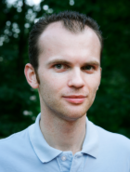
|
Christoph Noack Co-Lead OpenOffice.org User Experience I am working since a rather long time for OpenOffice.org and I have strong interestes in making something easy and pleasent to use. So I am very interested in all people who have the same goals ... or at least have interest in what we do. See you :-) Ich arbeite seit einiger Zeit für OpenOffice.org und habe ein starkes Interesse, dass Dinge gut zu benutzen sind und einfach Spaß machen. Tja, und deswegen bin ich an Kontakten mit Leuten interessiert, die die gleichen Ziele haben ... oder am Thema selbst interessiert sind. Bis bald also :-) |
yes / ja |

|
Björn Balazs OpenUsability.org, OpenSource-Usability-Labs.com, Apliki.de At OpenUsability.org we are actively working to bring together FOSS and Usability. I am looking forward to share experiences with you and to help making the products of this world a little more friendly... |
yes / ja |
| |
Liz Matthis OOo User Experience and Marketing |
yes |
| |
Lars Übernickel Lars is software developer working on a new printing experience for Linux desktops. You may be interested in his talk on Thursday: The Common Printing Dialog. |
arrived late :-) |
| |
... and some more! | |
Place and Date/ Ort und Zeit
Please note that the given information is preliminary. According to the organizers, the schedule might still change.
Derzeit sind die nachfolgenden Informationen noch vorläufig. Entsprechend der Angaben der Organisatioren kann sich der Zeitplan noch ändern.
| Title / Titel | Informal Meeting "FOSS and Usability" |
| Building / Gebäude | Hall / Halle 7, 1a |
| Room / Raum | Workshop Room "New York 2" |
| Date and Time / Datum und Zeit |
Friday, 2010-06-11, 9:00 ... 12:00 AM Freitag, 2010-06-11, 9.00 ... 12:00 Uhr |
The Meetup in Retrospect
The nine participants that came to the meetup at the Linux Tag in Berlin on Friday June 11 introduced themselves and then said why they are interested in this meeting. The lively, informative and enlightening discussion that ensued lasted for more than three hours, and even for some throughout the rest of the day. The discussion took place in English, but also sometimes in German. A summary of the discussion points is further below.
If you have any questions or comments, feel free to mail "ChristophNoack at openoffice dot org" or "liz at openoffice dot org" or just add your additional feedback to this page.
Many thanks to everyone who participated!
Summary
We touched on various topics. This is a brief summary of many of them.
Amarok: Paticipants exchanged experiences with the player in its various stages.
Terminology: Just the word "usability" turns off some listeners because they have a bad view of it.
OS Development: In open source development there is often nothing between development and the users. There needs to be an instance (a proxy) to interpret; a combination of people and tools. OpenOffice.org does have this instance in the UX community. They have a mainly non-developer community and the UX team works as interpreter between users and developers.
Poor Communication: It became clear when exchanging our experiences that poor communication and differing priorities are often at the heart of the difficulties. Points made: 1) a good product needs a good process, 2) there needs to be a balance between documenting and doing-----key phrases are "agile development", "documenting the essentials", "keeping records of rationale"
Java: The usability of Java code was mentioned as being created very usable from the start: object= noun, function= verb. Usability can be applied to all areas.
Market Research: You'll never get good usability by doing market research because people don't know what they want or could have. Apple was mentioned as not doing user research. Apple is lead by one visionary and are the opposite of free software: they do not release early or often; they expect the user to fit the product, not the other way around. What can we learn from Apple's approach? It is impossible to fill in every niche in the market with one product, so OS gives you the opportunity to customize a base product to fit each niche: "mass customization". This is where usability work is key to find out what subset of available functionality is needed and what needs to be added.
Short comings of free software: OS projects still fight each other. They all have operating costs and administrative overhead so that takes up resources (time and people) and reduces productivity. OPSI cofunding scheme example was cited (http://www.opsi.org/). One participant requested an API to enable export of data from proprietary software that lawyers use to OOo. He want to pay for this API and suggested a cofunding scheme.
Motivation for working in an OS Community: reputation, recognition, references for C.V. (when seeking employment). Each person has a personal reason. It is important to keep that inner motivation (sometimes money, fun, bonding). Many people say they want to help or give something back but they often get whilte noise because the projects do not cultivate and guide.
Problem of Money: If some people get paid to develop a product, others say why should I develop it for free? So they don't volunteer. You can save or ruing a project with money. The dilemna is where to spend money. Money is not allowed to become the primary motivator. OS doesn't help feed your family.
You need all the different roles: Developers, UX, Users, Documentation and not one person trying to do it all.
How to get developers to give priority to usability? Show them that their functionality/code is valuable but not getting used because the users can't find it, etc.
Buy-in: In OS projects you can't tell people what to do. You have to get buy-in, explain and be an example for others to follow.
Universities: The computer science courses at Univ. do not put enough emphasis on UX. The developers should have all seen a usability lab in action to be convinced.
Respecifying: It is sometimes easier to respecify a product if it has extremely poor usability. Fixes will never get to the root of the problem. "If you are sitting on a dead horse, get off." (quote from Steffen)
Further Information / Weitere Informationen
- OpenOffice.org auf dem LinuxTag 2010 (Page by the Germanophone Project): LinuxTag2010
- Official LinuxTag 2010 website (English) / Officielle LinuxTag 2010 Webseite (Deutsch)

